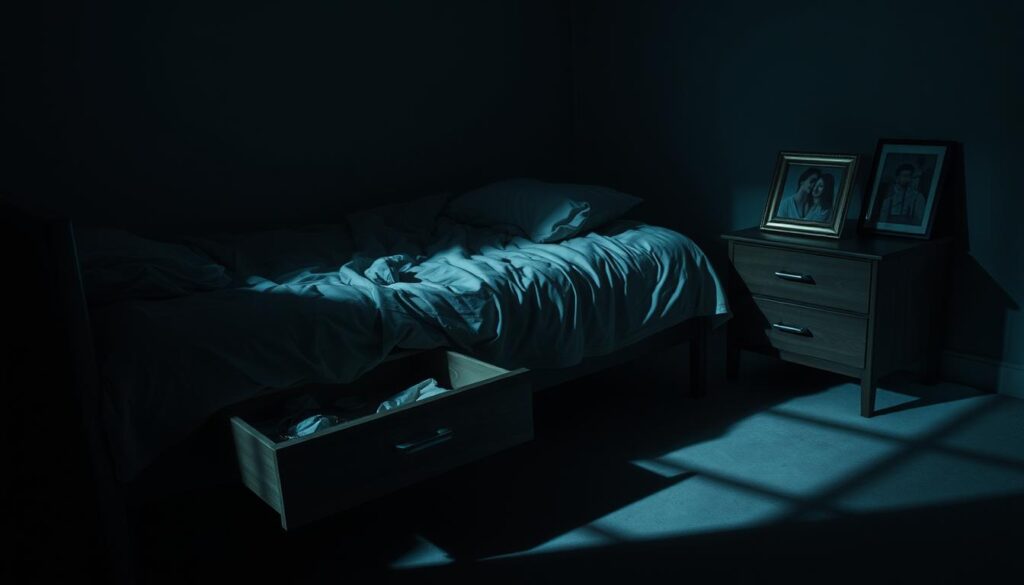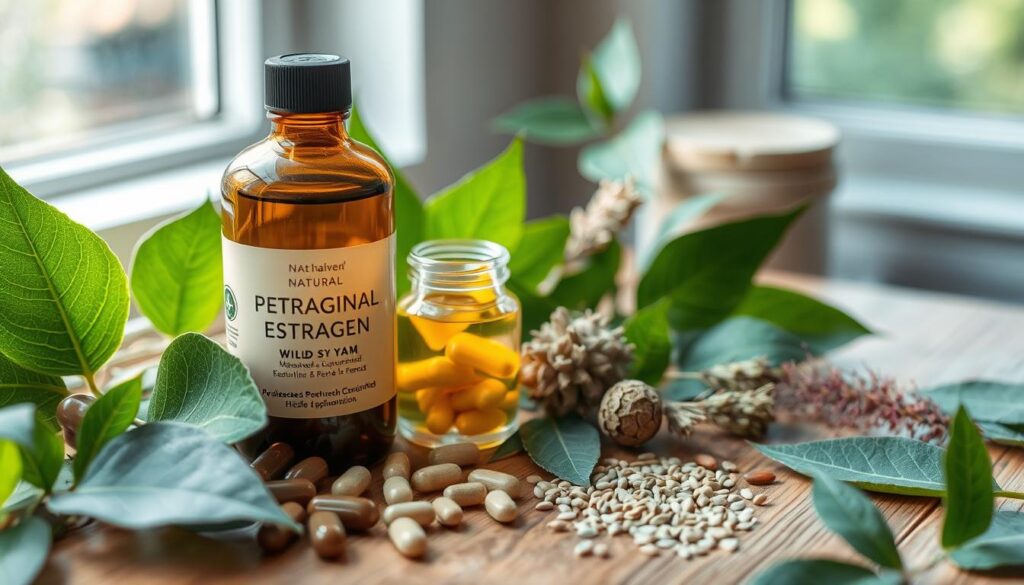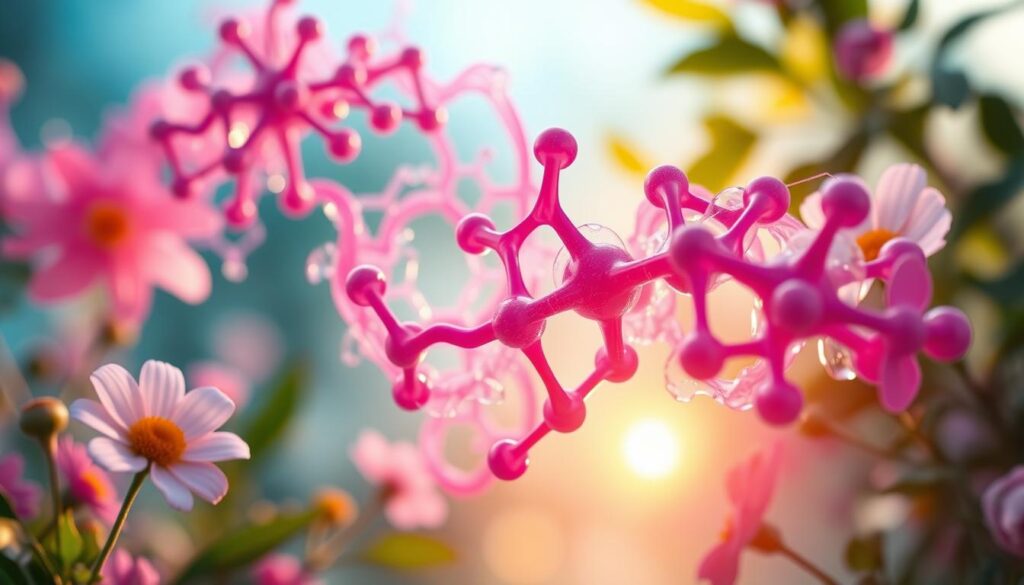Estrogen is a key hormone for women. It helps with growth, reproduction, and health. As you grow older, hormone levels change. This affects your sex drive and how you feel.
Knowing how estrogen and sex drive connect is important. This is true for any woman, especially during menopause. This guide will share the facts you need to know.
Key Takeaways:
- Estrogen, progesterone, and testosterone all influence sexual desire in women
- Low estrogen levels can lead to decreased libido, vaginal dryness, and other symptoms that impact sexual function
- Hormonal changes throughout a woman’s life, from puberty to menopause, can affect sexual desire
- Understanding the relationship between estrogen and sex drive is crucial for addressing sexual health concerns
- Maintaining a healthy balance of female sex hormones is essential for overall sexual wellbeing
Understanding Female Sex Hormones and Their Functions
As a woman, your body has many sex hormones. These hormones are key to your health and happiness. The main hormones are estrogen, progesterone, and testosterone. Each one does something special.
Types of Sex Hormones in Women’s Bodies
Estrogen is the main hormone for women. It comes from the ovaries. It helps with growth, the menstrual cycle, and sex health. Before menopause, estrogen levels are 15-350 pg/mL. After menopause, they go below 10 pg/mL.
Progesterone is also important. It comes from the ovaries, adrenal glands, and placenta. It keeps the menstrual cycle steady and gets the uterus ready for a baby. Progesterone levels change a lot, from 0.1–0.3 ng/mL before puberty to 65–290 ng/mL in the third trimester.
Testosterone is present in women too. It helps with fertility, sex drive, and muscle. For women, testosterone levels are 15 to 70 ng/dL.
Role of Hormones in Sexual Development
These hormones help girls grow into women during puberty. They cause changes like bigger breasts and body shape. The first period happens between 10-16 years old. It starts a regular cycle that lasts 25 to 36 days, with bleeding for 3-7 days.
How Hormones Affect General Health
Female hormones do more than just help with reproduction. Estrogen, for example, helps with cholesterol, bones, and brain health. Hormones also affect sex drive, with women wanting it most just before ovulation.
Knowing about these hormones is key to staying healthy and happy all your life.
The Connection Between Estrogen and Sexual Desire
Estrogen is key for a woman’s sex drive and arousal. It affects how wet her vagina gets and how strong her desire for sex is. Knowing how estrogen and sex desire are linked helps solve women’s sexual health issues.
As estrogen levels change in a woman’s cycle, so does her sex desire. Near ovulation, estrogen and testosterone go up, making her want sex more. This boost helps make her feel pleasure and want more.
But after ovulation, estrogen drops and progesterone goes up. This can make her sex desire go down. This change affects her libido and sexual health a lot.
During big life changes like perimenopause and menopause, estrogen drops. This can make her sex desire, vaginal wetness, and comfort during sex go down. These changes can hurt her sex life and overall happiness.
“Estrogen is essential for maintaining the health and function of the female reproductive system, including the vagina and clitoris. Declining estrogen levels can lead to a range of sexual problems, including low libido, vaginal dryness, and pain during sex.”
Women can take steps to keep their sex life healthy by understanding estrogen and sex desire. This helps them deal with hormonal issues and enjoy sex throughout their lives.
Does Estrogen Increase Sex Drive: The Scientific Evidence
Estrogen is key in boosting sexual desire, especially in postmenopausal women. Studies show estrogen therapy can greatly increase sexual desire in this group.
Research Studies and Clinical Trials
Research on rhesus monkeys shows estradiol levels match sexual behavior. Clinical trials also looked at estrogen and androgen therapy for low libido in postmenopausal women. This research gives us insights into how hormones affect women’s sexual desire.
Hormonal Impact on Libido
Hormone replacement therapy can treat symptoms like vaginal dryness and low libido. It helps by addressing physical and emotional issues. This can indirectly boost sex drive in individuals assigned female at birth.
Medical Expert Perspectives
Medical experts say fixing hormonal imbalances is key to increasing sexual desire. They suggest getting a blood test to check hormone levels. This helps create a personalized treatment plan to regain [estrogen therapy], [clinical trials], and [hormone balance].
Hormonal Changes During Different Life Stages
As a woman, your hormones change a lot in your life. These changes can affect your sex drive and how you feel close to others. Knowing about these changes is key to keeping your sex life healthy.
In puberty, estrogen and progesterone levels go up. This starts your body’s sexual growth. It makes you more aware of sex and wanting it.
When you get to pregnancy, your body makes more progesterone, relaxin, and human chorionic gonadotropin. This can make you feel more turned on and excited.
But, as you get closer to menopause, estrogen levels go down. This can make you less interested in sex and cause other problems. It’s a big change, but you can still keep your intimate life good.
| Life Stage | Hormonal Changes | Impact on Sexual Desire |
|---|---|---|
| Puberty | Increased estrogen and progesterone levels | Initiates sexual development and heightens sexual awareness |
| Pregnancy | Rising progesterone, relaxin, and human chorionic gonadotropin | Can lead to increased libido and arousal |
| Menopause | Declining estrogen production | Can result in decreased sex drive and other menopausal symptoms |
Knowing about hormonal changes helps you deal with your sex drive at every stage. It lets you keep your intimate life healthy and happy.
Symptoms of Low Estrogen and Sexual Desire
When estrogen levels drop, women may feel many changes. These can affect their sex drive and overall health. It’s important to know these signs to get the right help.
Physical Symptoms
Vaginal dryness is a big sign of low estrogen. It makes sex painful. Women might also feel uncomfortable during sex because their vagina isn’t as elastic or wet as it used to be.
Emotional and Psychological Effects
Low estrogen can also mess with how you feel. You might get irritated, anxious, or depressed. These feelings can make you want sex less, or not at all.
These physical and emotional signs can really affect a woman’s life. Getting medical help and making lifestyle changes can help. It can bring back the balance of hormones and make sex better.

“Declining levels of estrogen are primarily responsible for reducing sexual desire and making sexual arousal more challenging.”
| Symptom | Description |
|---|---|
| Vaginal Dryness | Thinning of vaginal tissues leading to discomfort during intercourse |
| Mood Changes | Irritability, anxiety, and depression negatively impacting sexual desire |
| Low Libido | Decreased sexual desire and arousal |
Knowing these symptoms is the first step. Women can then take action to fix the hormone problems. This can help their sex life and overall health.
Treatment Options for Low Libido
If you’re struggling with low libido, there are many ways to help. Hormone therapy and lifestyle changes can make a big difference. They can improve your intimate life.
Hormone Therapy
Estrogen therapy can help postmenopausal women feel more sexual desire. It uses levels of estradiol found during ovulation. Testosterone therapy at high levels can also help estrogen work better. These treatments can fix hormonal imbalances that lower libido.
Medications
The FDA has approved some medicines for low libido in women. Flibanserin (Addyi) is a daily pill that boosts libido. But, it can cause side effects like low blood pressure and drowsiness.
Bremelanotide (Vyleesi) is an injectable that also boosts libido. It might cause nausea, vomiting, and headaches. Always talk to a doctor before starting any new medicine.
Lifestyle Changes
Changing your lifestyle can also boost libido. Drinking less alcohol and staying active can help. So can treating any health problems.
Talking to a healthcare professional is key. They can help find the best treatment for you. This way, you can regain your sexual vitality.
| Treatment Option | Description | Potential Benefits | Potential Drawbacks |
|---|---|---|---|
| Estrogen Therapy | Hormone therapy that replaces or supplements estrogen levels | Can increase sexual desire in postmenopausal women | Potential side effects like breast tenderness, headaches, and increased risk of blood clots |
| Testosterone Therapy | Hormone therapy that replaces or supplements testosterone levels | Can enhance the effectiveness of low-dose estrogen therapies in boosting libido | Potential side effects like acne, mood changes, and increased risk of heart disease |
| Flibanserin (Addyi) | FDA-approved daily pill to treat low sexual desire in premenopausal women | Can help increase libido | Side effects like low blood pressure, drowsiness, and nausea |
| Bremelanotide (Vyleesi) | FDA-approved injectable medication to treat low sexual desire in premenopausal women | Can improve sexual desire | Side effects may include nausea, vomiting, flushing, headaches, and skin reactions |
| Lifestyle Changes | Adjustments to daily habits and routines | Can contribute to improved sexual well-being | Require consistent effort and commitment |
Finding the right treatment for you depends on your situation and health history. Working with your healthcare provider is crucial. They can help you find the best way to boost your libido and improve your sexual health.
Natural Ways to Balance Estrogen Levels
Keeping estrogen levels healthy is important for feeling good. There are natural ways to help balance your hormones. You can make lifestyle changes, eat better, and exercise regularly.
Lifestyle Changes
Managing stress is key for hormone balance. Try activities like meditation, yoga, and deep breathing to lower stress. Also, sleep well and relax to help your natural estrogen supplements.
Dietary Modifications
Your diet affects your hormones. Eating foods like soy and flaxseeds can help. Stay away from processed foods and too much alcohol to keep hormones balanced.
Exercise and Physical Activity
Exercise is good for your health and hormones. Activities like walking, swimming, or strength training help. Try to exercise for 30 minutes, most days, to feel better.
Remember, natural ways are good but talk to a doctor first. They can help you make the right changes for your health.
“Balancing hormones naturally is a journey, but the rewards are well worth the effort. Your body will thank you for taking the time to nourish it with the right lifestyle and dietary choices.”

Risks and Side Effects of Hormone Therapy
Hormone therapy can help with low libido. But, it’s key to know the risks and side effects. Estrogen side effects, hormone therapy risks, and estrogen dominance are important to think about.
Estrogen therapy might raise the risk of breast cancer and blood clots. This is especially true for older women or those with certain risks. Side effects can include breast tenderness, nausea, and headaches. Testosterone therapy might cause acne, too much body hair, and mood swings.
Talk openly with your doctor about hormone therapy’s risks and benefits. They can help you decide what’s best for you. This will depend on your symptoms, medical history, and what you prefer.
“The decision on which type of hormone replacement therapy to pursue should be based on individual symptoms, medical history, and preferences.”
Hormone therapy aims to boost your well-being, including sex life. Knowing the side effects and risks helps you make a choice that fits your health and lifestyle.
Think carefully about hormone therapy’s risks and side effects. Any treatment should be watched closely by a healthcare expert. By staying informed and working with your doctor, you can choose the best for your health.
Conclusion
Estrogen is very important for your female sexual desire and health. Knowing how estrogen affects your libido is key. Hormone therapy can help with low libido, but it has its own risks and benefits.
For a healthy sex life, try hormone therapy, lifestyle changes, and fixing health issues. Balancing estrogen and progesterone can boost your desire for intimacy. This can make your sex life better at any age.
Your sexual health is very important for your overall well-being. Learning about estrogen and other hormones helps you take care of your sex life. This way, you can enjoy a fulfilling intimate life.


A Life-Changing Experience with This Weight Loss Supplement (Nagano Tonic)
I’ve always struggled with finding a weight loss solution that actually works for me. Like many, I’ve tried numerous diets, exercise routines, and supplements over the years—some worked for a short time, but nothing ever gave me long-term results. That was until I decided to try the weight loss supplement I found : Link to the Supplement.
From the moment I started using it, I noticed a difference. Not only did I feel more energized, but my cravings also became more manageable. The best part? I started seeing results much quicker than I anticipated! Over the course of just a few weeks, I noticed a significant reduction in belly fat and overall weight loss that I hadn’t been able to achieve before.
What makes this supplement stand out from all the others I’ve tried is how it supports me in my daily routine without any jitters or energy crashes. I’m able to stay focused and motivated, which has made it easier to stay on track with my diet and exercise plan.
This product truly exceeded my expectations, and I feel more confident and healthier than ever before. If you’re struggling with your weight loss journey like I was, I highly recommend giving this supplement a try. It’s been a game-changer for me, and I’m sure it can work wonders for you too!
Contant Them on email .. tonicnagano50@gmail.com
I’ve tried so many weight loss products over the years, but nothing worked like this supplement! Since I started using it, I’ve noticed a big difference in my energy levels and appetite control. In just a few weeks, I’ve lost weight and feel so much better. It’s been easy to stick with, and the results speak for themselves. Highly recommend this to anyone looking to make a real change!
wasn’t sure what to expect, but this weight loss supplement has really impressed me! After just a few weeks of use, I’ve already dropped a few pounds and feel more motivated to stay active. It’s helped curb my cravings and boosted my energy throughout the day. I’m excited to keep going and see even better results. Definitely worth trying!
Reach them on tonicnagano50@gmail.com
This Nagano Tonic has been amazing! In just a few weeks, I’ve lost weight, feel more energized, and my cravings are under control. Highly recommend it!
Thats the link to purchase http://surl.li/iasppy